#Ermenonville
Text

View of the Lake at Ermenonville by Jean-Joseph-Xavier Bidauld
#jean joseph xavier bidauld#art#lake#ermenonville#lakes#gardens#garden#english gardens#paris#france#french#jardins#jardin#landscape#picturesque#temple#temples#neoclassical#neoclassicism#nature#pond#ponds#europe#european#boat#boats#romantic#romanticism
73 notes
·
View notes
Photo
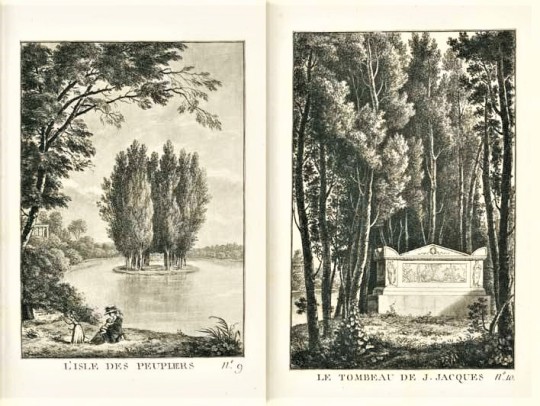

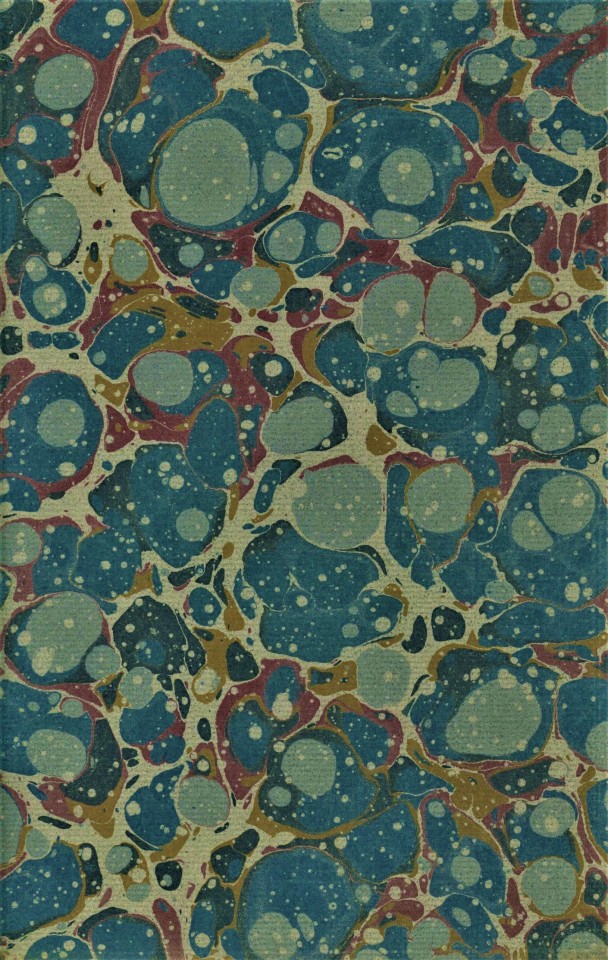
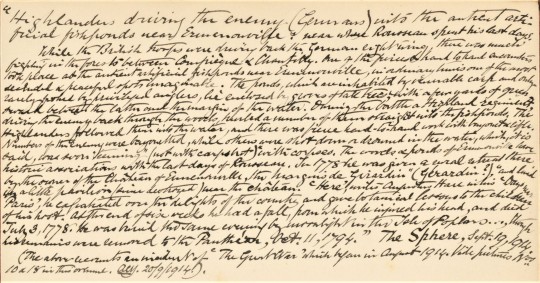

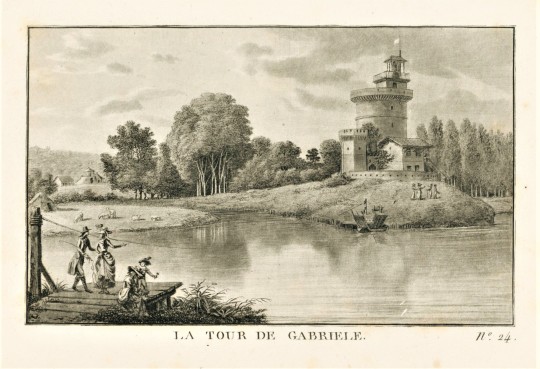
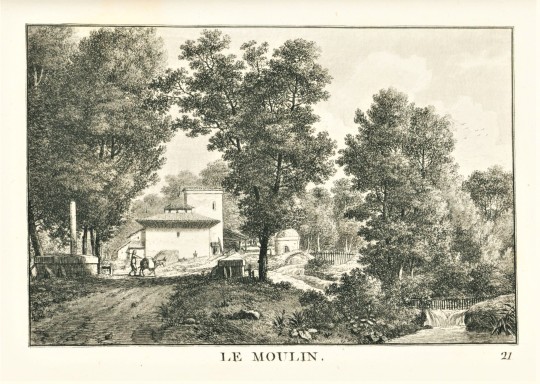



Decorative Sunday
This Sunday we present our 1811 copy of Promenade ou Itinéraire des Jardins D’Ermenonville, with aquatints by J. Marigot. Born Jacques-François Mérigot II (1760-1824) to the Parisian publisher and bookseller Jacques-François Mérigot (c. 1720-1799), the younger engraver and printer spent much of his career in London working under the name James Merigot. Promenade ou Itinéraire des Jardins D’Ermenonville was first published in 1788 by the elder Mérigot. Our 1811 printing also lists Merigot as publisher; by that time the business was most likely under the direction of Jacques-François’s younger brother, Jean-Gabriel Mérigot (c. 1738-1818). Also listed as publishers are (Claude) Brunot-Labbe and Le Normant, both of Paris, and M. Richard of Château d’Ermenonville. Printing was completed by L’Impimerie de Belin.
The book features twenty-five aquatints of views from D’Ermenonville, now known as Parc Jean-Jacques Rousseau. Located about an hour by car from the center of Paris, the gardens were cultivated by René de Girardin as an illustration of his ideal philosophical relationship between man and nature. Giradin was Jean-Jacques Rousseau’s last pupil and Rousseau spent the last six weeks of his life there, and was laid to rest in the park’s l’Ile des Peupliers. His remains were later relocated to the Panthéon; his empty tomb (or cenotaph) remains as a monument to the great French philosopher.
In addition to select aquatints, featured above is the book’s lovely Turkish-patterned marbled endpapers and two leaves of music for a song written by Girardin’s son Louis Stanislas de Girardin, titled “Du Berger du la Grotte Verte” or “Shepard of the Green Grotto.” Also included is a handwritten note written on the flyleaf, copied from the British newspaper The Sphere, dated September of 1914.
Find more Decorative Sunday posts here.
-Olivia, Special Collections Graduate Intern
#Decorative Sunday#Promenade ou Itinéraire des Jardins D’Ermenonville#Jardins D'Ermenonville#Ermenonville#Parc Jean-Jacques Rousseau#Jean-Jacques Rousseau#Rousseau#J. Marigot#Jacques-François Mérigot#James Merigot#aquatint#Belin#Le Normant#Brunot-Labbe#Chateau D'Ermenonville#René de Girardin#Decorative Plates#Decorative Arts#olivia
43 notes
·
View notes
Photo

Ermenonville, Oise, septembre 2019.
7 notes
·
View notes
Text
After three ways in the rain image
when waking your counterimage: he,
the magician. Angels weave you in
the dragonbody. Rings in the way,
long in the rain I become yours.
Unica Zürn, Will I Meet You Sometime?
trans. Pierre Joris
Ermenonville 1959
#poetry#unica zürn#1950s#anagram#anagram poetry#pierre joris#hans bellmer#automatism#hexentexte#intimacy
18 notes
·
View notes
Text
WILL I MEET YOU SOMETIME?
After three ways in the rain image
when waking your counterimage: he,
the magician. Angels weave you in
the dragonbody. Rings in the way,
long in the rain I become yours.
Anagram poetry by Unica Zürn, Ermenonville, 1959. Trans: Pierre Joris.
5 notes
·
View notes
Text

Temple of Philosophy at Ermenonville // Hubert Robert
6 notes
·
View notes
Text
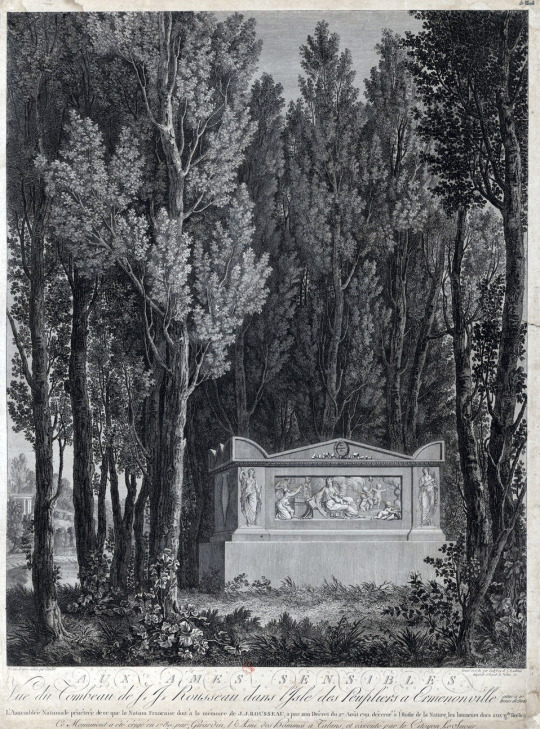
"Aux âmes sensibles" Vue du Tombeau de JJ Rousseau dans l'Isle des Peupliers à Ermenonville
3 notes
·
View notes
Quote
"La razón nos engaña a menudo, la conciencia nunca"
Jean Jacques Rousseau
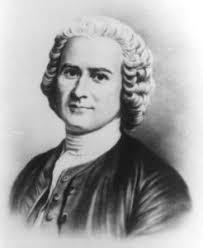
Fue un escritor, pedagogo, filósofo, músico, botánico y naturalista suizo nacido en Ginebra en junio de 1712.
Sus ideas influyeron en gran medida en la revolución francesa y en el desarrollo de las teorías republicanas.
Fue crítico con los pensamientos de Thomas Hobbes y de John Locke, el primero considerado como uno de los fundadores de la filosofía política o rama de la filosofía que estudia como debería ser la relación entre las personas y la sociedad, y el segundo al liberalismo, filosofía política y moral que defiende la libertad individual y la igualdad ante la ley.
Sus mayores diferencias radicaban en que Rousseau no admitía ninguna restricción en cuanto a los derechos y libertades individuales argumentando que el hombre que no tiene una libertad completa no es un hombre.
Su herencia de pensador radical y revolucionario hizo de Rousseau el más popular entre los miembros jacobinos. Una de sus obras más importantes fue “El contrato social", publicado en 1762 y que habla sobre la libertad e igualdad que debe existir entre los hombres y el estado, instituido mediante el establecimiento de un contrato social, base sobre la que se fundamenta buena parte de la filosofía liberal.
El radicalismo en algunos de sus escritos sobre todo el denominado alineación y el político-Juridico llamado la voluntad general lo vuelven tremendamente impopular al grado de que el parlamento da orden de arresto y se ve obligado a huir y vivir escapando de la ley hasta 1776 en donde
se le permitió regresar oficialmente con su nombre: pero bajo la condición de no publicar nunca nada más.
En 1771 termina de escribir sus memorias en donde intenta resolver o al menos dar testimonio de sus tremendas contradicciones, dedicándose a vivir de las lecturas públicas de sus memorias, apartándose definitivamente de la vida publica debido a los ataques de Voltaire y otros personajes de la época.
Falleció en la población francesa de Ermenonville Francia de un paro cardíaco en julio de 1778 a la edad de 66 años.
Fuente: Wikipedia
12 notes
·
View notes
Text
“Monday 3 p.m. [January 16, 1950]
Your letter at last! How weightless, how light the air is, how I breathe better! Just think: nothing since Friday, nothing since that sad letter... But it's all over, the sun that floods into my room is leaping up and down all over the place. I love you and I'll wait, yes I'll wait for everything to find you at last, alive, happy, desiring... Yesterday I completed my program. That is to say, I wrote sixteen letters. There are still as many left. But I've worked out a little form that I'll send to all the unwelcome and even to the others. It's like, "Mr. AC, who is ill, apologizes for not being able to... etc." With this I'll liquidate everything and I'll be able to think about my work at leisure.
I'm so ashamed that I've done almost nothing in two weeks! On the other hand, my appetite has returned. I look good and I seem to have put on weight. I sleep much better. From time to time an insomnia of two or three hours, but more rare. I am afraid of them, because then the imagination works too much. Last night I went through your whole life, I mean everything I know about it. Then I wait for the morning and the sun that puts the shadows on the run. Last night Kim's master came to pick him up. He had dinner here and I said goodbye to the beast.
I don't care if you sum up your days. But do this for me: be clear. Never put: "At 4 o'clock, an appointment." Say with whom. I know it's stupid, but it helps me. You understand me, by the way. You did well to advise Serge in the sense that you're telling me. There's no reason to deceive the audience. This Chinese system goes well with the Elite Theater! My dear love, my black, my beautiful, my lukewarm, what a desire I have for your presence, your warmth. I think of the little room suspended above Paris, of the falling evening, of the glow of the radiator and of us, linked to each other, in the penumbra... I also dream that I am walking through Paris with you, and that we are listing restaurants...
Darling, there was also sweetness, laughter, sweet complicity, infinite tenderness between us. And this is what I also regret, at my hours, as at others I regret the storm of desire, or the perfect hour near the lake, in the sky of Ermenonville. It is you as a whole that I regret. And if I desire so much to have the strength to sink into my work it is to be able to arrive at spring, free in heart and mind, and melt totally into you. Write every day, if you can. Give me the dates of your shows. And send me your love, Maria darling, I use it every hour. How I kiss you! Until it wears off, precisely, my beautiful face...
Monday 10 p.m. [January 16, 1950]
After writing to you this afternoon, we went for a little walk in a group. The light was beautiful, but I was bored. I love this country in solitude. It was getting cold under the sun. I went home and started working. I redid my preface and wrote about half of it. I thought of you, I was warm at heart. Dinner and then a moment by the fire. No one was talking, so I came alive, I said stupid things, I laughed. Those lonely excesses leave you sad afterwards.
I went back to my room, got into bed, and there you are. The wind picked up outside and blew around the house. But the room is warm. I can imagine you. I love you. I'm caressing you. Close to you, even closer... I love the night, with you, the enclosed spaces, the secluded countryside, the ends of the world, but with you. So I wait, with patience or with rage, I wait for those moments when the world is depopulated, when everything is silent, when there is only us and those black horses, you know. My darling love, wait, my love, come back soon. And until then be strong and patient, armed with all my faithful love. I kiss you endlessly.”
Albert Camus to Maria Casarès, Correspondance, January 16, 1950 [#130]
#albert camus#camus#absurd#absurdism#maria casares#correspondance#love letters#love#sad#sun#alive#desire#warmth#tenderness#strength#solitude#night#world#patience#rage#silent
12 notes
·
View notes
Text
Tuesday 23 July 1833
7 5
11 ¼
dullish finish morning F67 ½° at 7 5 am. sat reading Le Constitutionnel – breakfast at 8 55 – out (took my 2 servants) at 10 – got a billet d’entrée at the tapissiers’ opposite the church – presented it at the Lodge and took a little girl from there as guide thro’ the gardens and to the palace and ecuries – the Jardin Anglais of the last 13 years creation very pretty but all the trees of the fir tribe – l’isle d’amour nothing a mere road to and thro’ a sort of large charpente (wood painted white) covered walk thro’ two straight narrowish canals but full of fish – the grand canal (1/2 lieue long) fine – not much to see in the palace or chateau – handsome gallery, the bottoms of the great condé on each side of it – these were sequestrated in the 1st revolution when the grand chateau was demolished, but picked up again and repurchased by the last duc de Bourbon – the most curious thing and almost incredibly so, is the table standing in the midst of the gallery of vine root (pied de vigne) 45 sur 22 pouces – Madame de Feuchères’ apartment on the rez de chaussée and very very plain and simple, and small rooms – not at all handsome – she is as much hated here as the duc was beloved – In the chateau d’Enghien (called by the late duc poor d’Enghiens’ father chateau neuf because he could not bear to hear it called by his sons’ name) at a little distance above the chateau a good plain range of building, nothing particular to see, so did not go to it – the Ecuries 600ft. long for 180 horses (when the troops were quartered there, there were 400 horse) magnificent – a gallery midway round the great dome in the centre from which a fine coup d’oeil down the 2 fine lofty vaults where the horses stand – over these excellent apartments for the servants which open outside upon a balcony extending the whole length of the building and from which a fine view over the forest – look over Morfontaine – a peep of Ermenonville, and Seuils cathedral (4 petites lieues distant) very conspicuous – the woman who shewed the Ecuries launched out more than the rest – would not faire mal à un oiseau but if she could to anything would to Madame de Feuchères – une méchante femme - all believe she was the death of the poor duc – pas par sa main but the cause of his death – he had found out how méchante she was – he had latterly been a martyr to her – spent the last fortnight of his life in writing – was going to alter his will – but all his papers that he had lastly written were burnt – the procès not finished – but suspended – Louis de Rohan now in Bohême – only wanted the marriage portion that his mother, the late dukes’ wife, had – so till the procès was finished nobody could buy St. Leu but the king – from the Ecuries’ at 11 40 sent off to the chateau de la reine Blanche – went thro’ the forest and walked it in 1 5 hour at the rate of good 3 miles per hour – at the table ronde turned right aux Etangs at the bottom of which the chateau – very pretty little Gothic building done up by the late duc and furnished in the style of the period of queen Blanche – it was a mill a few years ago – some excellent imitation old chairs capital model for Shibden see again and inquire more about this very well done thing – a gable-ended building each corner finished off in a round tower – one ½ 3 stories and a [?], the other 2 –
SH:7/ML/E/16/0086
- ¼ hour during a smartish shower – home in an hour by particularly another way in an hour at 2 10 – Eugénie heated and very much tired and Thomas tired too – I not at all but a plis (crevice, crease) in my stocking had rather blistered my right foot – however walked about for 10 minutes looking at the hotel Bourbon condé (not so good as our own) etc. and came in at 2 20 – dozed a little and finished Herschells’ [Herschel] discourse on the study of natural philosophy by 4 – then looking over bills – dinner at 6 – afterwards till 9 wrote out today, and had up my hostesse, and arranged all for staying till Thursday – food air here, charming forest to walk – comfortable apartment – can get my accounts a little arranged tomorrow and then be a little at ease in Paris – till 10 reading over the whole of the Constitutionnel of today – the 2nd reading of the Irish church bill carried in the Lords by a majority of 59 in favour of ministers – fine day till 12 ¾ a.m. a little rain between 2 and 3 and very heavy longish shower about 4 – afterwards fine, save a little rain in the evening – F68 ½° at 10 ½ p.m.
2 notes
·
View notes
Link
0 notes
Text
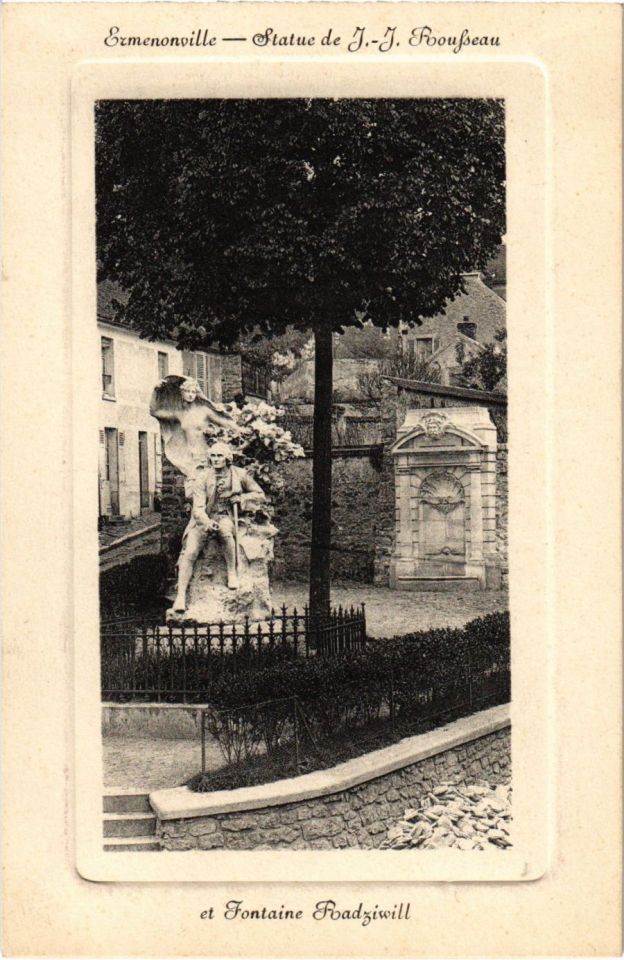
Radziwill fountain and Rousseau's statue in Ermenonville, Picardy region of northern France
French vintage postcard
#historic#photo#briefkaart#fountain#vintage#region#rousseau#sepia#photography#carte postale#postcard#radziwill#postkarte#france#postal#tarjeta#northern#statue#ansichtskarte#french#old#ermenonville#ephemera#postkaart#picardy
4 notes
·
View notes
Text
Events 3.3 (after 1930)
1931 – The United States adopts The Star-Spangled Banner as its national anthem.
1938 – Oil is discovered in Saudi Arabia.
1939 – In Bombay, Mohandas Gandhi begins a hunger strike in protest at the autocratic rule in British India.
1940 – Five people are killed in an arson attack on the offices of the communist newspaper Flamman in Luleå, Sweden.
1942 – World War II: Ten Japanese warplanes raid Broome, Western Australia, killing more than 100 people.
1943 – World War II: In London, 173 people are killed in a crush while trying to enter an air-raid shelter at Bethnal Green tube station.
1944 – The Order of Nakhimov and Order of Ushakov are instituted in USSR as the highest naval awards.
1944 – A freight train carrying stowaway passengers stalls in a tunnel shortly after departing from Balvano, Basilicata, Italy just after midnight, with 517 dying from carbon monoxide poisoning.
1945 – World War II: In poor visibility, the RAF mistakenly bombs the Bezuidenhout area of The Hague, Netherlands, killing 511 people.[8]
1953 – A De Havilland Comet (Canadian Pacific Air Lines) crashes in Karachi, Pakistan, killing 11.
1958 – Nuri al-Said becomes Prime Minister of Iraq for the eighth time.
1969 – Apollo program: NASA launches Apollo 9 to test the lunar module.
1972 – Mohawk Airlines Flight 405 crashes as a result of a control malfunction and insufficient training in emergency procedures.
1974 – Turkish Airlines Flight 981 crashes at Ermenonville near Paris, France killing all 346 aboard.
1980 – The USS Nautilus is decommissioned and stricken from the Naval Vessel Register.
1985 – Arthur Scargill declares that the National Union of Mineworkers' national executive voted to end the longest-running industrial dispute in Great Britain without any peace deal over pit closures.
1985 – A magnitude 8.3 earthquake strikes the Valparaíso Region of Chile, killing 177 and leaving nearly a million people homeless.
1986 – The Australia Act 1986 commences, causing Australia to become fully independent from the United Kingdom.
1991 – An amateur video captures the beating of Rodney King by Los Angeles police officers.
1991 – United Airlines Flight 585 crashes on its final approach to Colorado Springs killing everyone on board.
2005 – James Roszko murders four Royal Canadian Mounted Police constables during a drug bust at his property in Rochfort Bridge, Alberta, then commits suicide. This is the deadliest peace-time incident for the RCMP since 1885 and the North-West Rebellion.
2005 – Steve Fossett becomes the first person to fly an airplane non-stop around the world solo without refueling.
2005 – Margaret Wilson is elected as Speaker of the New Zealand House of Representatives, beginning a period lasting until August 23, 2006, where all the highest political offices (including Elizabeth II as Head of State), were occupied by women, making New Zealand the first country for this to occur.
2013 – A bomb blast in Karachi, Pakistan, kills at least 45 people and injured 180 others in a predominantly Shia Muslim area.
2017 – The Nintendo Switch releases worldwide.
0 notes
Text
On this day in Wikipedia: Sunday, 3rd March
Welcome, velkomin, willkommen, fáilte 🤗
What does @Wikipedia say about 3rd March through the years 🏛️📜🗓️?

3rd March 2023 🗓️ : Death - Kenzaburō Ōe
Kenzaburō Ōe, Japanese novelist, 1994 Nobel Prize laureate in Literature (b. 1935)
"Kenzaburō Ōe (大江 健三郎, Ōe Kenzaburō, 31 January 1935 – 3 March 2023) was a Japanese writer and a major figure in contemporary Japanese literature. His novels, short stories and essays, strongly influenced by French and American literature and literary theory, deal with political, social and..."

Image licensed under CC BY-SA 3.0? by Thesupermat
3rd March 2019 🗓️ : Death - Peter Hurford
Peter Hurford OBE, British organist and composer (b. 1930)
"Peter John Hurford OBE (22 November 1930 – 3 March 2019) was a British organist and composer...."
3rd March 2014 🗓️ : Death - William Pogue
William R. Pogue, American colonel, pilot, and astronaut (b. 1930)
"William Reid "Bill" Pogue (January 23, 1930 – March 3, 2014) was an American astronaut and pilot who served in the United States Air Force (USAF) as a fighter pilot and test pilot, and reached the rank of colonel. He was also a teacher, public speaker and author. Born and educated in Oklahoma, Pogue..."

Image by NASA
3rd March 1974 🗓️ : Event - Turkish Airlines Flight 981
Turkish Airlines Flight 981 crashes at Ermenonville near Paris, France killing all 346 aboard.
"Turkish Airlines Flight 981 (TK981/THY981) was a scheduled flight from Istanbul Yeşilköy Airport to London Heathrow Airport, with an intermediate stop at Orly Airport in Paris. On 3 March 1974, the McDonnell Douglas DC-10 operating the flight crashed into the Ermenonville Forest, (23.46 mi) (37.76..."

Image licensed under GFDL 1.2? by
Steve Fitzgerald
3rd March 1924 🗓️ : Event - Ottoman Caliphate
The Ottoman Caliphate, the world's last widely recognized caliphate, was abolished.
"The caliphate of the Ottoman Empire (Ottoman Turkish: خلافت مقامى, romanized: hilâfet makamı, lit. 'office of the caliphate') was the claim of the heads of the Turkish Ottoman dynasty to be the caliphs of Islam in the late medieval and early modern era. During the period of Ottoman expansion,..."
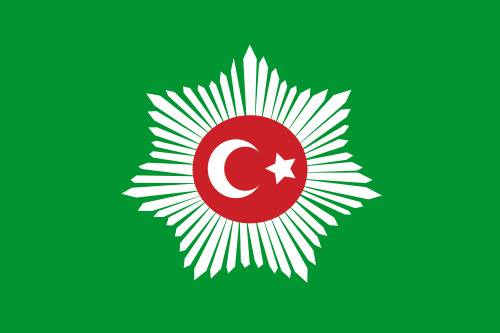
Image by TRAJAN 117
3rd March 1820 🗓️ : Event - United States Congress
The U.S. Congress passed the Missouri Compromise, which balanced the admission of Missouri as a slave state with that of Maine as a free state.
"The United States Congress is the legislature of the federal government of the United States. It is bicameral, composed of a lower body, the House of Representatives, and an upper body, the Senate. It meets in the U.S. Capitol in Washington, D.C. Senators and representatives are chosen through..."

Image by Ipankonin
3rd March 🗓️ : Holiday - Christian feast day: Winwaloe
"Winwaloe (Breton: Gwenole; French: Guénolé; Latin: Winwallus or Winwalœus; c. 460 – 3 March 532) was the founder and first abbot of Landévennec Abbey (literally "Lann of Venec"), also known as the Monastery of Winwaloe. It was just south of Brest in Brittany, now part of France. ..."

Image by Abgrall Jean-Marie (1846-1926)
0 notes
Text
Digging Up the Dead
During the 1780s, the very decade when the new American nation had its genesis, a highly unusual tomb was being planned to rebury the French philosopher and social critic Jean-Jacques Rousseau (1712–78) on an island in a small lake at Ermenonville, near Senlis.
The explanation lies in the contrasts between two kinds of political cultures—one more nearly univocal in terms of basic democratic values, the other with partisans speaking past one another.
— Michael Kemmen
0 notes
Text

“If ever vanity made anyone happy on earth, that someone could only be a fool.”
Jean-Jacques Rousseau
“The greatest vanity!
All is vanity and a striving after the wind, and there is nothing profitable under the sun."
(King Solomon from the book of Ecclesiastes 1:2; 2:11) jw.org
“Se mai la vanità fece felice qualcuno sulla terra, quel qualcuno non poteva essere altri che uno sciocco.”
Jean-Jacques Rousseau
“La più grande vanità! Ogni cosa è vanità e un correr dietro al vento, e non c'è nulla di vantaggioso sotto il sole”."
(Re Salomone dal libro di Ecclesiaste 1:2; 2:11)
Jean-Jacques Rousseau (Ginevra, 28 giugno 1712 – Ermenonville, 2 luglio 1778) è stato un filosofo, scrittore, pedagogista e musicista svizzero.
0 notes